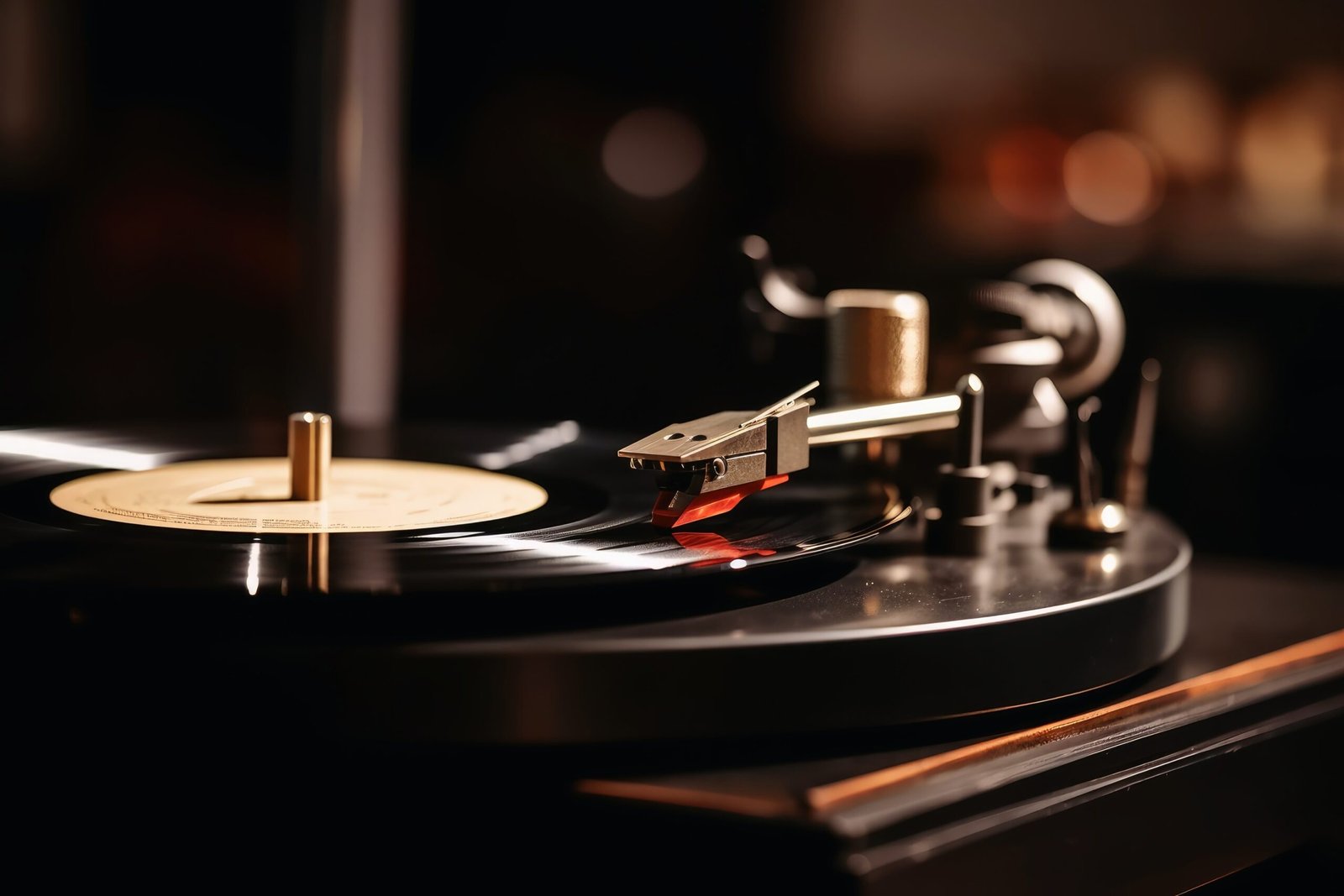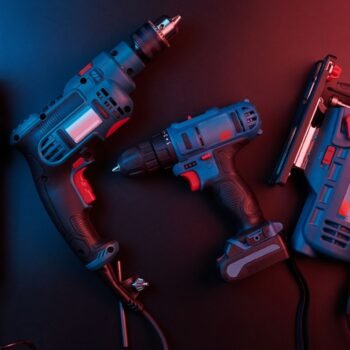Vinyl has a warmer, richer sound than digital – it’s just different. You get those subtle pops and crackles. There’s a ritual: placing the needle, feeling the album art. It connects you to music more deeply. Finding the right turntable makes a huge difference. Whether you’ve collected records for years or are just starting out, this guide helps you find the best turntable for your music.
Before we get to picks, here’s key turntable info:
- Two main drive types exist: belt-drive (better isolation from motor noise) and direct-drive (better speed stability)
- A quality phono cartridge is crucial for accurate sound reproduction
- Some turntables need a separate phono preamp, while others have one built-in
- Features like auto-stop, cue levers, and easy speed switching enhance usability
- Build quality affects both sound performance and longevity
- Consider connectivity needs—some models offer Bluetooth or USB connections
- Your budget will determine which features you can prioritize
Editor’s Choice
Fluance RT85N: Premium Performance
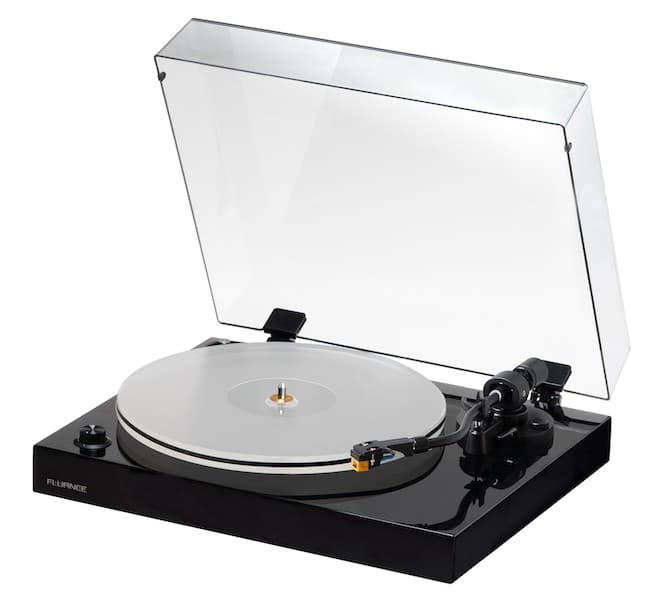
The Fluance turntable RT85N stands out as our top recommendation for serious vinyl enthusiasts who want exceptional sound quality without breaking the bank. This premium turntable delivers accurate, detailed sound that works beautifully with any genre of music.
Specifications:
- Drive type: Belt-drive
- Speeds: 33 1/3, 45 RPM
- Cartridge: Nagaoka MP-110
- Platter: Acrylic
- Built-in preamp: No
- Auto-stop function: Yes
Pros:
- Exceptional build quality with premium materials
- Accurate speed performance with minimal distortion
- Superior sound isolation with quality feet
- Excellent cartridge included
- Easy to set up and use
- Auto-stop convenience
Cons:
- No built-in phono preamp
- Doesn’t support 78 RPM records
- Limited finish options
Angels Horn H019: A Vintage-Inspired Gem
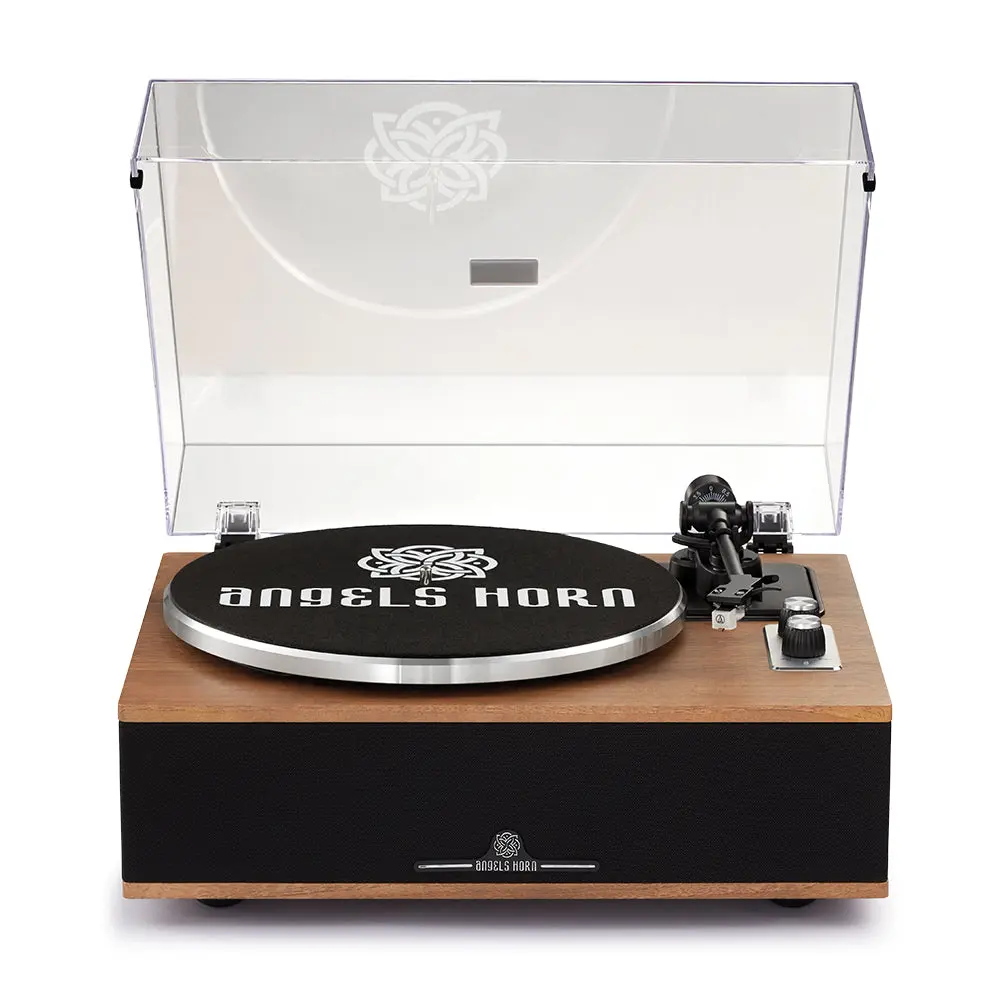
For those seeking a beautiful all-in-one solution, the Angels Horn H019 combines vintage turntable aesthetics with modern functionality. This record player stands out with its wooden finish, quality components, and surprising sound performance.
Specifications:
- Drive type: Belt-drive
- Speeds: 33 1/3, 45 RPM
- Cartridge: Audio-Technica AT-3600L
- Built-in speakers: Yes
- Additional connectivity: Bluetooth, auxiliary input
- Auto-stop function: Yes
Pros:
- All-in-one system with decent built-in speakers
- Beautiful wood-finish design
- Quality Audio-Technica cartridge
- Bluetooth connectivity for streaming
- Good build quality compared to other all-in-one systems
- Ready to use out of the box
Cons:
- Sound quality can’t match separate component systems
- Limited upgrade path
- Some setup required
Second Best: A Close Contender
Rekkord F300: Sleek and Reliable
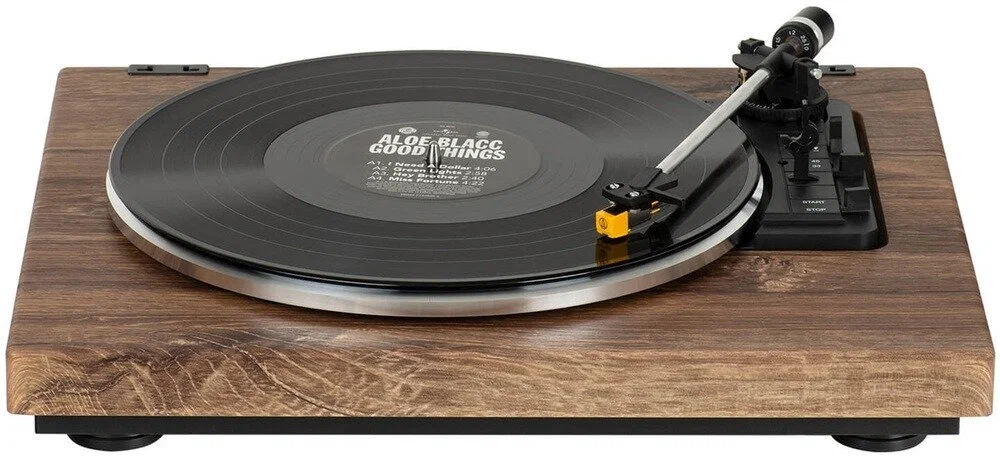
The Rekkord F300 is an excellent fully automatic option that nearly matched our top pick in sound quality. If you value the convenience of automatic operation, this might be the best turntable for your needs.
Specifications:
- Drive type: Belt-drive
- Speeds: 33 1/3, 45 RPM
- Cartridge: Ortofon OM 10 (optional upgrade)
- Platter: Metal
- Built-in preamp: No
- Operation: Fully automatic
Pros:
- Excellent sound quality with great transparency
- Fully automatic operation
- Very accurate speed performance
- Simple setup process
- High-quality build with premium materials
- Available in two finishes
Cons:
- Some design quirks with automatic functionality
- Non-removable RCA/grounding cables
- No built-in phono preamp
- Doesn’t support 78 RPM records
Ideal for Specific Needs
Audio-Technica AT-LPW50BT: A Modern Classic
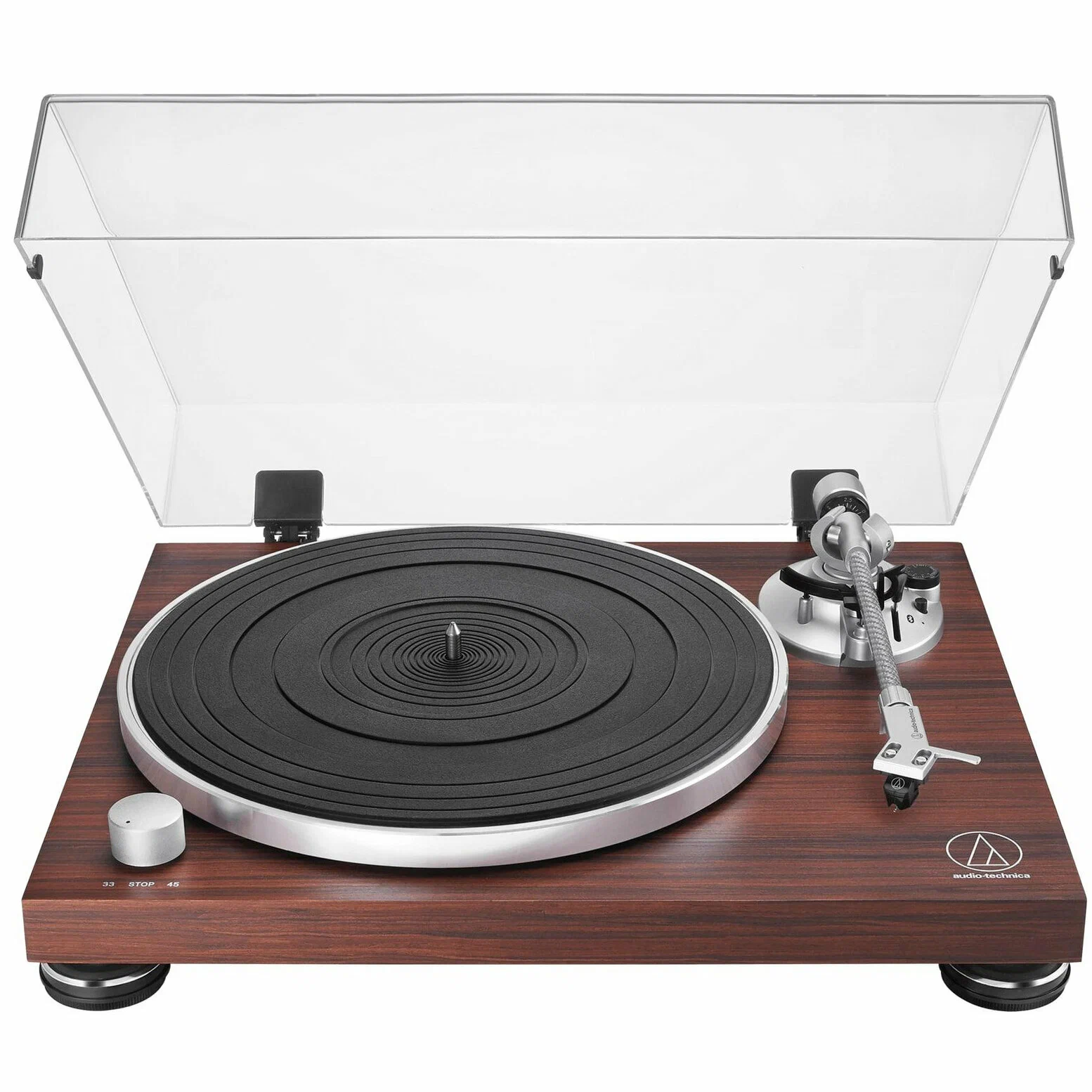
For listeners who want modern connectivity options without sacrificing sound quality, the Audio-Technica AT-LPW50BT is the best Bluetooth turntable on the market in this price range. It bridges the gap between analog and digital music perfectly.
Specifications:
- Drive type: Belt-drive
- Speeds: 33 1/3, 45 RPM
- Cartridge: AT-VM95E
- Built-in preamp: Yes
- Bluetooth connectivity: Yes
- Platter: Aluminum
Pros:
- Built-in phono preamp for easy setup
- Bluetooth connectivity for wireless speakers
- Quality AT-VM95E cartridge included
- Intuitive operation and controls
- Solid build quality with rosewood finish
- Switchable line/phono output for flexibility
Cons:
- Sound quality slightly behind our top picks
- Lighter plinth and platter affect isolation
- Only available in one finish
- No auto-stop function
Best on a Budget
U-Turn Orbit Basic: Affordable Excellence
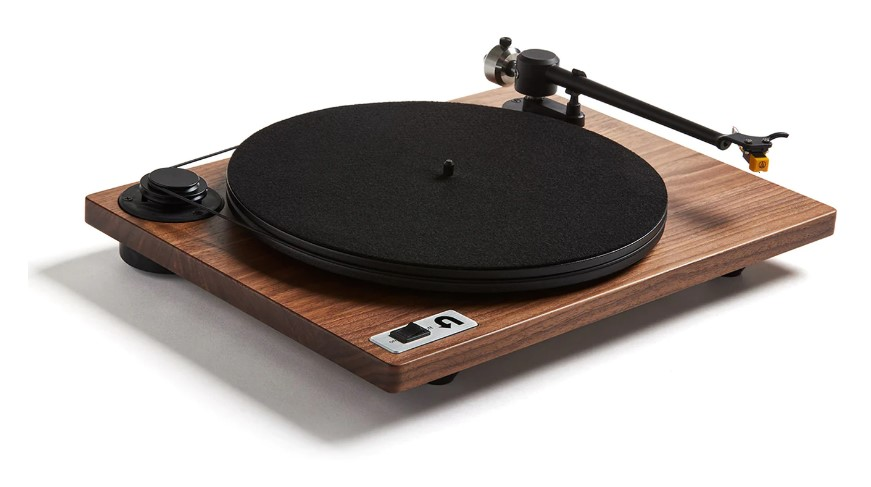
The U-Turn Orbit Basic proves you don’t need to spend a fortune to get good sound. This best budget turntable focuses on sound quality essentials while trimming convenience features to keep costs down.
Specifications:
- Drive type: Belt-drive
- Speeds: 33 1/3, 45 RPM (manual change)
- Cartridge: Audio-Technica AT91B
- Built-in preamp: Optional add-on
- Platter: Acrylic
- Available colors: Multiple options
Pros:
- Excellent sound quality for the price
- Highly customizable with various upgrade options
- Quick and easy setup
- Quality tonearm and components
- Made in USA with good customer support
- Clean, minimalist design
Cons:
- Manual speed changing (requires belt movement)
- No cue lever in base configuration
- No auto-stop function
- Requires separate phono preamp unless added as an option
Audio-Technica AT-LP70XBT with Bluetooth
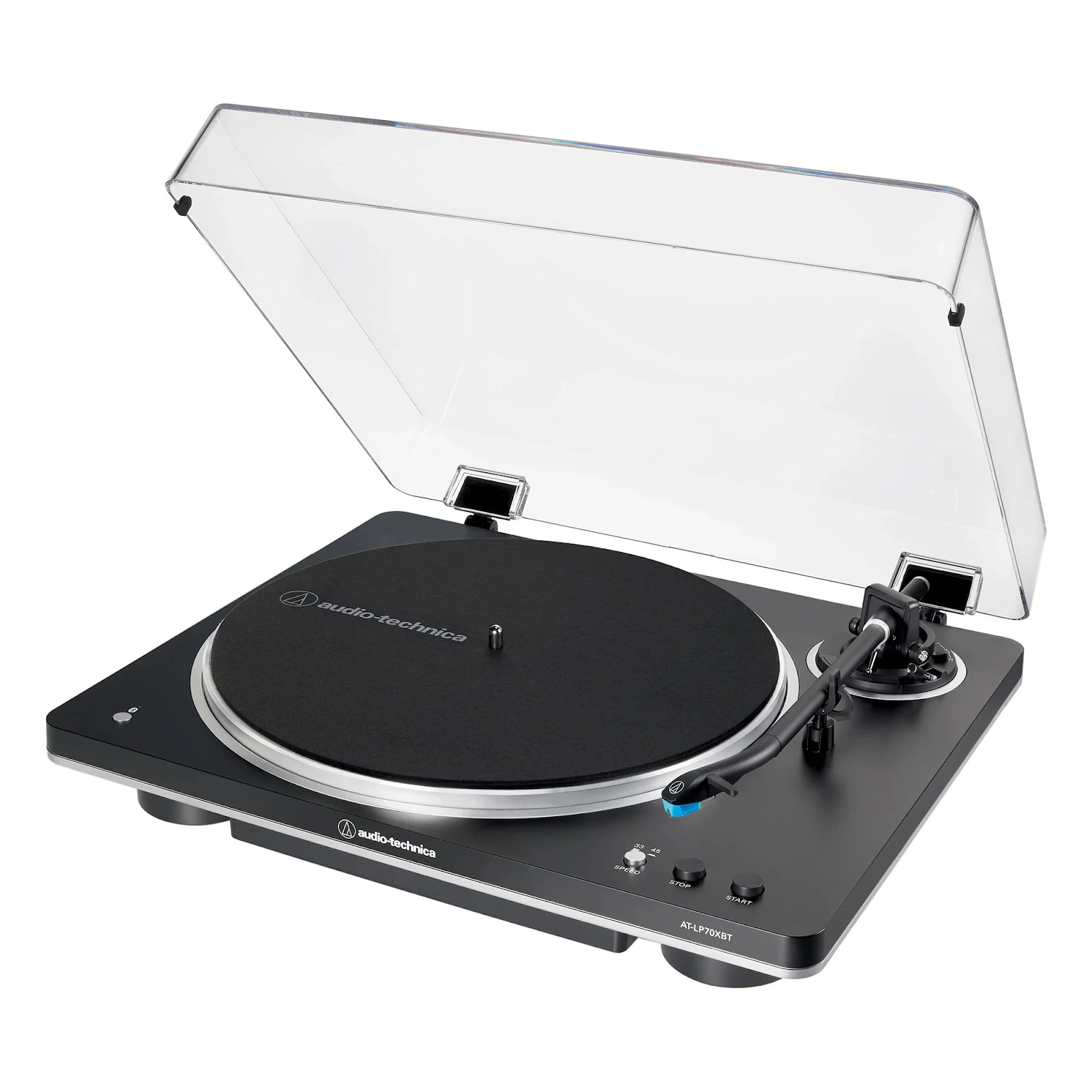
If you’re looking for an entry-level Buetooth turntable with good sound and reliable performance, the Audio-Technica AT-LP70XBT delivers solid value. It’s perfect for those just starting their vinyl journey who want wireless convenience.
Specifications:
- Drive type: Belt-drive
- Speeds: 33 1/3, 45 RPM
- Cartridge: AT-VM95C
- Built-in preamp: Yes
- Bluetooth connectivity: Yes
- Auto-stop function: Yes
Pros:
- Easy Bluetooth pairing with good range
- Built-in phono preamp
- Simple operation with auto-stop feature
- Decent sound quality for the price point
- Upgradable cartridge
- Sleek, modern design
Cons:
- Lower-grade cartridge than pricier models
- Basic build quality
- Limited isolation from vibrations
- Some plasticky components
Who Should Invest in a Turntable?
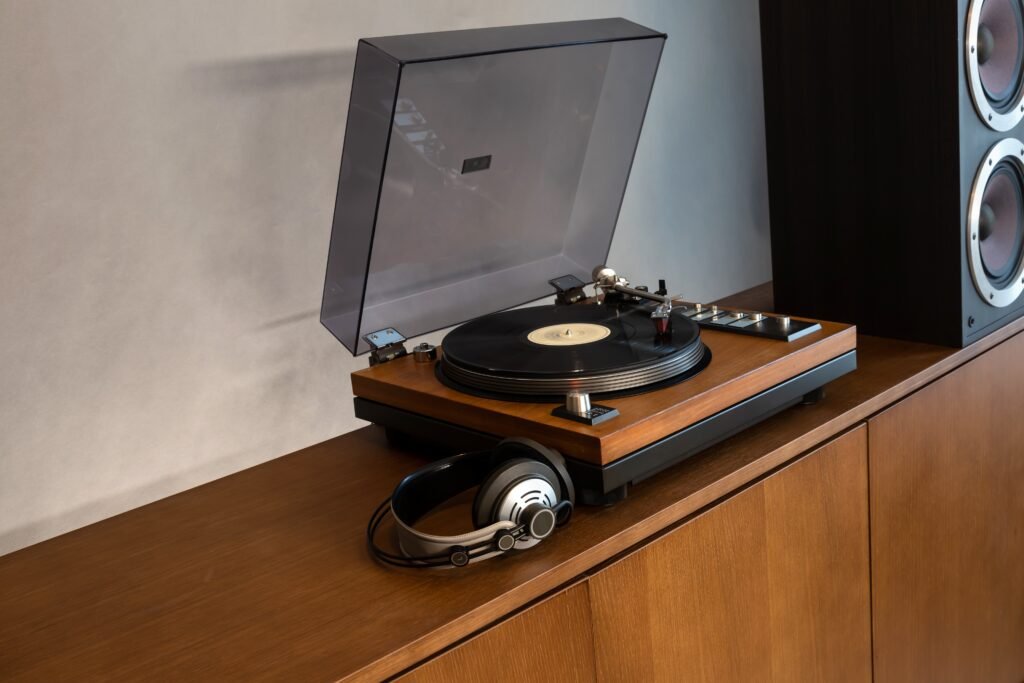
Turntables aren’t just for audio experts anymore. Lots of people enjoy them. Maybe you like holding a record, seeing big album art, or hearing music the way bands meant it to sound. If that sounds good, a quality player could be right for you. It works well for vinyl collectors, music lovers, and even casual listeners wanting better sound.
Feel drawn to records’ warm tone? Enjoy finding old music? Want to slow down and really focus on listening? A turntable fits. It’s also ideal if you already own vinyl or inherited a collection you want to play right.
Today’s options suit everyone. Tech-savvy folks can digitize records using a USB turntable. Purists can find the best turntable offering pure analog sound. There’s something for every listener now.
Alternative Turntables Worth Exploring
If our top picks don’t quite match your needs, consider these worthy alternatives:
- Pro-Ject Debut Carbon Evo – Outstanding performance with premium components
- Sony PS-LX310BT – Excellent entry-level option with Bluetooth
- Rega Planar 1 – Minimalist design with exceptional sound quality
- Denon DP-400 – User-friendly semi-automatic operation
- Crosley C10 – Affordable Pro-Ject collaboration with good sound
- Technics SL-1500C – Premium direct-drive option with built-in preamp
- Pioneer PLX-500 – DJ-friendly design with recording capabilities
- Portable turntable options like the Audio-Technica AT-LP60XBT for space-constrained setups
Key Factors When Choosing a Turntable
Do Turntables Require External Speakers?
Most turntables do require external speakers, as they typically don’t include built-in amplification or speakers. You’ll need:
- A phono preamp (built into some turntables or receivers)
- An amplifier or receiver
- Speakers
All-in-one record players like the Angels Horn H019 are exceptions, containing everything you need in one package. However, separate components typically deliver better sound quality and flexibility for upgrades.
Vintage vs. Modern: Which Turntables Are Better?
Choosing between vintage and modern turntables really comes down to what you prefer.
Older models often boast amazing build quality. They use heavy materials many newer budget players just can’t match. A well-maintained best vintage turntable can deliver truly outstanding sound.
Modern players, though, win on ease. Setup is simpler, and they work better with today’s gear. You often get handy extras like USB ports or Bluetooth. Plus, they come ready to play – fresh cartridges, no need for refurbishment.
So, picking the best turntable for you? Think about your tech skills, whether you want modern conveniences, and if you love classic engineering or prefer current tech. Your own priorities matter most.
High-End Turntables: Are They Worth the Splurge?
High-end turntables can unlock impressive sonic upgrades. You might hear finer details, a wider soundstage, and clearer sound overall. But there’s a catch: spending twice as much doesn’t mean you get twice the sound quality. That’s the law of diminishing returns kicking in.
For most listeners, a turntable priced between $300 and $600 hits the sweet spot. Moving up to models costing $1,000 or more brings refinements. Casual listeners might not even notice these improvements, especially without equally good speakers and an amp. Instead of overspending on just the best turntable, think about upgrading your whole system proportionally. Balance matters more than one super-expensive piece.
Budgeting for Your Ideal Turntable
When budgeting for a turntable, remember that it’s just one part of your audio system. A general guideline:
- Avoid sub-$100 models that might damage records
- Entry-level quality starts around $200-300
- Sweet spot for value/performance is $400-600
- Diminishing returns begin after $600-800
Also budget for a phono preamp (if not built-in), amplification, and speakers if you don’t already have them. Setting aside funds for accessories like a record brush, stylus cleaner, and turntable stand is also wise.
Is an Expensive Turntable a Smart Investment?
Quality turntables can last decades with proper maintenance, making them sound investments for dedicated vinyl enthusiasts. Higher-end models typically offer:
- Better build quality and longevity
- Superior sound performance
- Upgradable components
- Better record preservation
- Potential to hold value
However, an expensive turntable is only worth it if you’ll use it regularly and have a system that can showcase its capabilities. For casual listeners, a mid-range option often provides the best value.
Record Players vs. Turntables: Key Differences Explained
The turntable vs record player distinction confuses many shoppers. What is a turntable exactly? A turntable is specifically the device that spins the record and houses the tonearm and cartridge. It requires external components to produce sound.
A record player is an all-in-one system that includes a turntable plus the necessary amplification and speakers. Record players offer convenience but typically compromise on sound quality and component quality.
Choose a turntable if you prioritize sound quality and want the flexibility to upgrade components individually. Choose a record player if simplicity and space-saving are your primary concerns.
The Most Reliable Turntables: Top Recommendations
Reliability in turntables comes from quality components, solid engineering, and good customer support. Brands with particularly strong reliability records include:
- Technics – Legendary durability, especially direct-drive models
- Audio-Technica – Consistent performance with good parts availability
- Fluance – Excellent build quality and customer service
- Pro-Ject – Precision engineering with repairable designs
- Rega – Simplicity leads to fewer failure points
Reliability also depends on proper maintenance—regular stylus cleaning, belt replacement when needed, and keeping the turntable dust-free.
What Defines a High-Quality Turntable?
A high-quality turntable is defined by several key characteristics:
- Speed accuracy and stability
- Low wow and flutter (speed variations)
- Effective isolation from vibrations
- Quality tonearm with proper geometry
- Good cartridge with replaceable stylus
- Solid construction with heavy platter
- Precision bearings for smooth operation
- Low rumble and mechanical noise
These factors combine to provide accurate sound reproduction, protect your records, and deliver a satisfying listening experience. Quality isn’t always about price—some mid-range models outperform more expensive options in key areas.
Does Vinyl Really Offer Superior Sound?
The debate over vinyl’s sound quality versus digital formats is complex. Vinyl offers:
- An analog signal path without digital conversion
- A warm, rich sound character many find pleasing
- Dynamic range limitations that can be musically flattering
- Physical engagement with music
Digital formats provide:
- Perfect consistency with no wear
- Potentially lower noise floor
- Perfect speed stability
- Greater convenience
Many listeners prefer vinyl not because it’s technically “better” but because they enjoy its particular sound characteristics and the ritual of physical media. The best format is ultimately the one that brings you more enjoyment of your music.
Are Cheap Turntables Risky for Your Records?
Yes, very cheap turntables can potentially damage your vinyl records. Common issues with budget models include:
- Heavy tracking force that accelerates groove wear
- Poor quality styli that can scratch records
- Inconsistent speed that affects playback
- Inadequate isolation causing skipping
- Non-adjustable tonearms that can’t be properly calibrated
If you value your record collection, avoid turntables under $100 and be cautious even in the $100-$200 range. Look for models with adjustable counterweights and replaceable cartridges at minimum.
Is a USB Port Necessary for My Turntable?
A USB port is only necessary if you plan to digitize your vinyl collection. USB functionality allows you to connect the turntable directly to a computer and record your records as digital files. This is useful for:
- Preserving rare or valuable records
- Creating digital copies for mobile listening
- Sharing vinyl-only music with others
- Archiving personal collections
If you don’t plan to digitize your records, you can save money by choosing a model without USB functionality. The feature adds cost but doesn’t affect analog playback quality.
Our Selection Process: How We Tested the Best Turntables
To ensure our recommendations truly represent the best options available, we conducted thorough testing of each turntable. Our turntable reviews process included:
- Unboxing and setup evaluation to assess user-friendliness
- Build quality assessment, examining materials and construction
- Speed accuracy testing using specialized equipment
- Listening tests with various music genres and recording qualities
- Performance testing for wow and flutter (speed consistency)
- Evaluation of noise isolation and vibration resistance
- Feature testing including auto-stop, speed changes, and special functions
- Value assessment comparing price to performance and features
- Long-term testing to evaluate reliability and consistency
- Comparative testing against similar models in the same price range
This comprehensive approach allowed us to identify which turntables deliver the best overall experience for different needs and budgets. We prioritized sound quality, ease of use, and value to help you find the perfect match for your vinyl journey.
The resurgence of vinyl isn’t just about nostalgia—it’s about experiencing music in a more intentional, engaging way. Whichever model you choose, you’re joining a growing community rediscovering the joy of physical media in our increasingly digital world.


